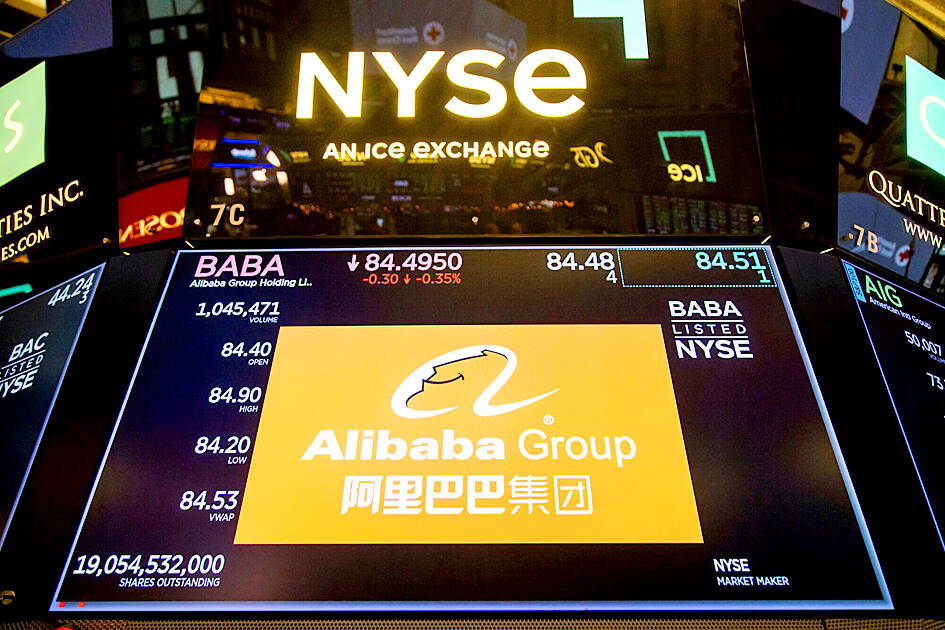Chinese technology company Alibaba Group Holding Ltd (阿里巴巴) yesterday released a new version of its Qwen 2.5 artificial intelligence (AI) model that it said surpassed the highly acclaimed DeepSeek-V3.
The unusual timing of the Qwen 2.5-Max’s release, on the first day of the Lunar New Year when most Chinese people are off work and with their families, points to the pressure Chinese AI start-up DeepSeek’s (深度求索) meteoric rise in the past three weeks has placed on not just overseas rivals, but also its domestic competition.
“Qwen 2.5-Max outperforms ... almost across the board GPT-4o, DeepSeek-V3 and Llama-3.1-405B,” Alibaba’s cloud unit said in an announcement posted on its official WeChat account, referring to OpenAI and Meta Platforms Inc’s most advanced open-source AI models.

Photo: Bloomberg
The Jan. 10 release of DeepSeek’s AI assistant, powered by the DeepSeek-V3 model, as well as the Jan. 20 release of its R1 model, has shocked Silicon Valley and caused tech shares to plunge, with the Chinese start-up’s purportedly low development and usage costs prompting investors to question huge spending plans by leading AI firms in the US.
However, DeepSeek’s success has also led to a scramble among its domestic competitors to upgrade their own AI models.
Two days after the release of DeepSeek-R1, TikTok owner ByteDance Ltd (字節跳動) released an update to its flagship AI model, which it said outperformed Microsoft Corp-backed OpenAI’s o1 in AIME, a benchmark test that measures how well AI models understand and respond to complex instructions.
This echoed DeepSeek’s claim that its R1 model rivaled OpenAI’s o1 on several performance benchmarks.
The predecessor of DeepSeek’s V3 model, DeepSeek-V2, triggered an AI model price war in China after it was released in May last year.
The fact that DeepSeek-V2 was open-source and unprecedentedly cheap, only 1 yuan (US$0.14) per 1 million tokens — or units of data processed by the AI model — led to Alibaba’s cloud unit announcing price cuts of up to 97 percent on a range of models.
Other Chinese tech companies followed suit, including Baidu Inc (百度), which released China’s first equivalent to ChatGPT in March 2023, and the country’s most valuable Internet company, Tencent Holdings Ltd (騰訊).
Liang Wenfeng (梁文鋒), DeepSeek’s enigmatic founder, said in a rare interview with Chinese media outlet Waves in July last year that the start-up “did not care” about price wars and that achieving AGI (artificial general intelligence) was its main goal.
OpenAI defines AGI as autonomous systems that surpass humans in most economically valuable tasks.
Liang said he believed China’s largest tech companies might not be well suited to the future of the AI industry, contrasting their high costs and top-down structures with DeepSeek’s lean operation and loose management style.
“Large foundational models require continued innovation, tech giants’ capabilities have their limits,” he said.

South Korea’s equity benchmark yesterday crossed a new milestone just a month after surpassing the once-unthinkable 5,000 mark as surging global memory demand powers the country’s biggest chipmakers. The KOSPI advanced as much as 2.6 percent to a record 6,123, with Samsung Electronics Co and SK Hynix Inc each gaining more than 2 percent. With the benchmark now up 45 percent this year, South Korea’s stock market capitalization has also moved past France’s, following last month’s overtaking of Germany’s. Long overlooked by foreign funds, despite being undervalued, South Korean stocks have now emerged as clear winners in the global market. The so-called “artificial intelligence

NEW IDENTITY: Known for its software, India has expanded into hardware, with its semiconductor industry growing from US$38bn in 2023 to US$45bn to US$50bn India on Saturday inaugurated its first semiconductor assembly and test facility, a milestone in the government’s push to reduce dependence on foreign chipmakers and stake a claim in a sector dominated by China. Indian Prime Minister Narendra Modi opened US firm Micron Technology Inc’s semiconductor assembly, test and packaging unit in his home state of Gujarat, hailing the “dawn of a new era” for India’s technology ambitions. “When young Indians look back in the future, they will see this decade as the turning point in our tech future,” Modi told the event, which was broadcast on his YouTube channel. The plant would convert

‘SEISMIC SHIFT’: The researcher forecast there would be about 1.1 billion mobile shipments this year, down from 1.26 billion the prior year and erasing years of gains The global smartphone market is expected to contract 12.9 percent this year due to the unprecedented memorychip shortage, marking “a crisis like no other,” researcher International Data Corp (IDC) said. The new forecast, a dramatic revision down from earlier estimates, gives the latest accounting of the ongoing memory crunch that is affecting every corner of the electronics industry. The demand for advanced memory to power artificial intelligence (AI) tasks has drained global supply until well into next year and jeopardizes the business model of many smartphone makers. IDC forecast about 1.1 billion mobile shipments this year, down from 1.26 billion the prior

People stand in a Pokemon store in Tokyo on Thursday. One of the world highest-grossing franchises is celebrated its 30th anniversary yesterday.